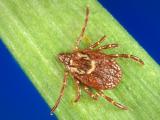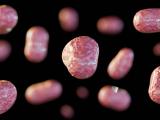Oct 20, 2005 (CIDRAP News) The US government has issued about $60 million in contracts to spur development of a vaccine against tularemia, the National Institutes of Health (NIH) announced recently.
The National Institute of Allergy and Infectious Diseases (NIAID), a division of NIH, has issued two 5-year contracts for vaccine work, the agency said earlier this month. The agency also awarded $87 million in grants to build four biosafety level 3 (BSL-3) labs.
"Devising medical countermeasures against biological threats, whether they arise naturally or are the result of deliberate human action, is a top priority for NIAID," said Anthony Fauci, MD, NIAID director. "These new awards support research needed to better understand and defend against disease-causing microbes and provide funds to construct facilities where such research can be performed safely."
Research to find and evaluate new tularemia vaccine candidates will be conducted by the University of New Mexico, with C. Rick Lyons, MD, as principal investigator, and by DVC LLC of Frederick, Md., with Robert House, PhD, as principal investigator. DVC LLC is a private company that develops biodefense vaccines and drugs for the Department of Defense.
Tularemia, caused by Francisella tularensis, is also known as rabbit fever. The disease can spread through bites from ticks, deerflies, or other insects; handling infected animal carcasses; eating or drinking contaminated food or water; or inhaling the bacteria. It is not known to spread from person to person. The disease can be fatal if not treated with the right antibiotics.
F tularensis was listed as a category A biological warfare agent as a result of World War II and Cold Warera research and weaponizing of the bacterium by Japan, Russia, and the United States. The pathogen can be made into an aerosol that could be used to spread the disease widely, according to the NIAID.
The four new BSL-3 labs will be added to nine other BSL-3 labs funded by NIAID in the Regional Biocontainment Laboratory program. The institutions receiving lab funding are George Mason University, Manassas, Va.; Tufts University, North Grafton, Mass.; the University of Louisville, Ky.; and the University of Hawaii at Manoa.
See also:
NIH news release
http://www.nih.gov/news/pr/oct2005/niaid-03.htm
DVC LLC news release on tularemia research grant
http://www.csc.com/investor_relations/press_releases/1456-csc_wins_35_1_million_niaid_contract_for_development_of_tularemia_vaccine














